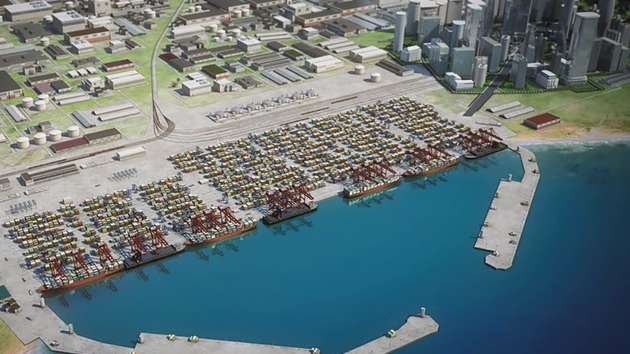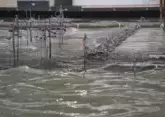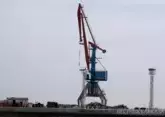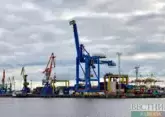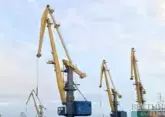The fate of the Anaklia Deep-Sea Port, a project to build an artificial deepwater port in western Georgia, has again been called into question after the country’s government cancelled its contract with the Anaklia Development Consortium (ADC), a group of Georgian and international investors working on the infrastructure project. Emerging Europe reports in its article What now for Anaklia, Georgia’s largest infrastructure project, as blame game heats up? that according to the Georgian regional development and infrastructure ministry, the ADC failed to comply with raising 120 million US dollars in capital and submitting a 400 million US-dollar loan agreement with international banks, giving the Georgian government “an unconditional right” to cancel their contract.
On January 14, the Georgian government again ruled out that it would restore the terminated contract with the ADC. The consortium was also issued a fine of 115,000 US dollars for “failing obligations” by the deadline. Reacting to the infrastructure ministry’s decision, ADC director Levan Akhvlediani announced that the consortium would file a lawsuit with the court of arbitration. “There is practically no way out other than going to court,” he stressed, questioning the government’s motives.
“The ADC has repeatedly sought to avoid a dispute not to cause further delay to the project,” Salome Kelenjeridze, the consortium’s deputy CEO tells Emerging Europe, noting that it now has “no choice but to pursue its rights and the interests of its stakeholders using all legal remedies available.” She says that the ADC will make a final attempt to resolve its dispute with the Georgian government amicably. However, if unsuccessful, it “will subsequently have no choice but to pursue an international arbitration claim against the government.”
“The Georgian government’s indifference toward the project is the biggest obstacle that we were facing on every stage of the project development,” she continues, pointing to problems that occurred during negotiations with international financial institutions, investors and future partners. According to the ADC deputy CEO, it is evident that Georgia’s government, “is not acting in the best interest of the project and hence in the best interest of Georgia.”
Mamuka Khazaradze, the former chairman of the ADC supervisory board also promised to take the dispute to an international court, stressing that Georgian prime minister Giorgi Gakharia and Bidzina Ivanishvili, Georgia’s most influential politician, were personally involved in disrupting the project. “The government has misled the public,” he said. However, later he also added that he wanted to avoid arbitration as it would harm the interests of the country.
Disputes between the consortium and the Georgian government intensified last year after Conti Group International, a major US investor, decided to pull out from the project. While both the current government of Mr Gakharia and that of his predecessor Mamuka Bakhtadze have came out in support of the project several times, the ADC last October accused the government of sabotage aimed at halting the project, when it failed to issue state guarantees for the 400 million US dollars loan the consortium needed to secure.
“It is quite widespread that Mr Khazaradze (…) and his colleagues are trying to mislead the public when putting blame on the shoulders of the Georgian government,” Ghia Abashidze, a Georgian political analyst tells Emerging Europe. According to him, it has been clear that the ADC could not fulfil its obligations since more than 40 amendments were made to the contract signed back in 2016 when the Consortium won a public procurement call of 2.5 billion US dollars to build the port.
Ms Kelenjeridze claims that only minimal concession were needed from the government to satisfy all parties, including IFIs that should have provided the Consortium with a loan agreement. While the Georgian government has done its part – including bringing in railway tracks to the port area, buying land and transferring them to the ADC, the Consortium failed to raise the necessary capital and deliver for seven times, Mr Abashidze stressed, noting that becoming a guarantor of the construction loans was not envisaged in the project contract.
“The authorities had two options after termination – either transforming the port into the state enterprise or announcing a new tender. The latter has been decided,” he said, dismissing narratives that the project would not be realised since the ruling Georgian Dream party even amended the country’s constitution to guarantee the future of the project. “Regrettably, four years wasted, incomes delayed. Nevertheless, expectation in the government is that a new partner will be found soon,” Mr Abashidze concluded. “Georgia needs this port, so we will search for a new partner, who will be able to implement this project quickly and get the results that our country needs,” said Georgian vice PM and infrastructure minister Maia Tskitishvili on January 9, adding that they need a “financially stronger investor.”
The Anaklia project was launched as a joint US-Georgian venture to create a new, deepwater sea port on the Black Sea. The current members of the Consortium are Georgia’s TBC Holding, SSA Marine from the US, British investment group Wondernet Express and G-Star Ltd from Bulgaria.
The first phase of the port was set to be fully operational by December 2020 with a handling capacity of up to 10,000 vessels. The construction is the largest infrastructure investment in Georgian history. Observers say that the Consortium’s leave could direct attention from China to finish the project.
